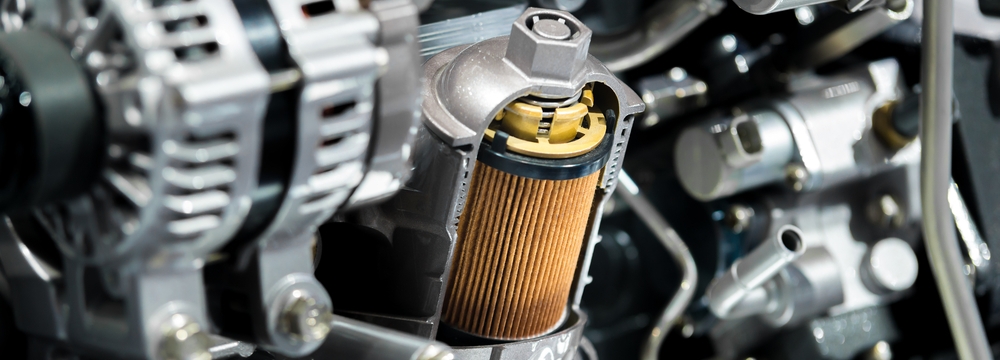
23 Jun My Car’s Oil Filter: Is It Really That Important ?
 With most of us pinching pennies this summer, you may be wondering if all the car maintenance you do is really necessary. According to AAA, “The average vehicle owner will spend 9.68 cents per mile, or $1,452 in a 15,000-mile year, on car maintenance and repairs.” That’s a lot of pennies. However, when comparing routine maintenance costs, such as an oil change, to buying a new car, the price of fresh engine oil and a new oil filter is a better investment. As car owners, we all know how critical it is to have clean engine oil, but let’s examine the importance of a new oil filter.
With most of us pinching pennies this summer, you may be wondering if all the car maintenance you do is really necessary. According to AAA, “The average vehicle owner will spend 9.68 cents per mile, or $1,452 in a 15,000-mile year, on car maintenance and repairs.” That’s a lot of pennies. However, when comparing routine maintenance costs, such as an oil change, to buying a new car, the price of fresh engine oil and a new oil filter is a better investment. As car owners, we all know how critical it is to have clean engine oil, but let’s examine the importance of a new oil filter.
Oil Filter Manufacturing
Most oil filters utilize both machine and hand labor during the manufacturing process, incorporating a variety of materials. Their outer shells are circular, painted steel canisters with one solid end and one threaded end that attaches to the engine. Inside the canister are several layered components, including:
- Filter bypass valve
- Center tube
- Pleated paper or fabric filter
- Anti-drain back valve
- Support spring
Their shapes and sizes vary depending on your vehicle’s make and model, as well as the type of engine.
Testing Oil Filter Quality
Upon completing the assembly process, the oil filters are quality tested by trained technicians. They mount the filter to a test bench with pressurized air and water outlets. Filters pass the test if no air bubbles appear in the water after about 15 seconds of pressure. Those that fail the test return to production for reworking before retesting. Qualified filters undergo a drying process to remove all moisture.
Packaging and Distribution
Oil filters that pass the quality testing move on to the silkscreening process. Workers apply company branding (logos, part numbers, SKUs) to the filters on an automated conveyor belt system with screen printing ink or an inkjet printer (or both). An oven helps dry and set the ink, preventing it from smearing or rubbing off. After the printing process, they undergo an oiling process to inhibit surface rust while the product is on the shelf. The final packaging includes a plastic film seal before the product is boxed appropriately for retail.
What An Oil Filter Does
Before engine oil reaches internal engine parts, the oil pump moves it through the oil filter. The filter traps dirt and tiny metal particulates in its pleated filter to prevent such debris from damaging the engine. When a clogged filter significantly obstructs oil flow, the bypass valve opens, allowing engine oil to lubricate internal components. When this happens, unfiltered oil circulates throughout the engine, dispensing dirty oil where it should not be. To prevent the bypass valve from circulating contaminated engine oil, follow the factory-recommended routine maintenance.
Oil Filter Types
Not all oil filters look the same, nor do they all function at the same level. For automobiles, they typically employ media made of natural and synthetic fibers, which are pleated to maximize surface area. Most are categorized into two main types: spin-on and cartridge, although other options also exist.
Cartridge Oil Filters
Cartridge oil filters contain a replaceable filter component inside a permanent outer housing. You will only need to replace the inner filter, and therefore, these filters are often more environmentally friendly. They are commonly found in more modern engines, providing efficient filtration and reduced waste.
Centrifugal Oil Filters
Centrifugal oil filters use (you guessed it) centrifugal force to remove particulate matter from the oil. The spinning motion forces heavier particles to the outer edge of the filter, where a service technician can easily remove them. This type of filter is primarily used in high-performance and racing engines, as it provides effective filtration under extreme conditions.
Magnetic Oil Filters
Magnetic oil filters use magnets to attract and capture metallic particles in the oil. These filters are particularly effective at trapping small metal debris that engine components may produce. While these filters are not a standalone solution, they complement other types, enhancing overall filtration efficiency.
Spin-on Oil Filters
These are one of the most common types, and are user-friendly and easy to replace. Featuring a self-contained canister that screws onto the engine block. Their convenient and efficient design makes them a go-to choice for many vehicle owners. However, many auto manufacturers are slowly phasing them out in favor of more environmentally conscious filter types.
When To Replace Your Oil Filter
Every auto manufacturer suggests specific replacement intervals. The time frame for your vehicle depends on several factors. Read your owner’s manual for the best replacement schedule for your vehicle make, model, and year. Typically, you can expect to change your oil filter during every oil change service. Of course, occasionally, your car may experience issues outside the suggested maintenance time frame. Schedule a diagnostic service if your vehicle has any of the following problems:
- Dashboard warning lights illuminated (Check Engine, Oil Can)
- Engine noises (knocking, rattling, pinging)
- Leaking oil under your car or inside the engine compartment
- Overheating engine
Oil Change Service in Ann Arbor, MI
Ron’s Garage in Ann Arbor, MI, will gladly discuss the importance of using the correct engine oil, oil filter, and routine maintenance interval for your vehicle. Our experienced, ASE-certified technicians will service your car quickly and efficiently, getting it back on the road in no time.
Make An Appointment
To schedule your next oil change service, call Ron’s Garage at (734) 961-4701 or visit us online.
To schedule your next oil change service, call Ron’s Garage at (734) 961-4701 or visit us online.

